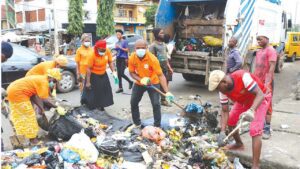
Alleged N39.5bn project duplication: Why all concerned authorities must give explanations
If not a necessity under other systems of government, under democracy it is. The need for accountability remains one core tenet of democracy which readily finds expression in the definition of what the system itself is crafted to be. The evolution of the system has grown to be synchronised with the needs for explanations to be given on critical matters of broad concern. Hence, the spread of democracy and the acceptability of the system across majority of nations of the world have put forth general principles which on popular grounds have become widely accepted as norms which have been synchronised as attributes of the democratic system. These tenets have segmented to define the composition of what character a democratic system should assume.
Since the system of government has grown to the degree of that of representative government in response to the complexity of human society where the people rule themselves by their chosen representatives, the need for responsive account to be rendered to them by the latter on how they are been governed becomes sacrosanct. Accountability and its close associate of transparency, openness and responsiveness have developed to constitute the instruments to channel the demands of responsiveness to the populace who have in trust given their representatives the mandate of steering the course of government for general purpose. Hence, the character of the system demands that robust parameters of accountability for explanations of processes in the running of governance take a prime place to give the populace the sense of belongingness in the governance of their polity. In Nigeria, the response of the custodians of the political architecture to public demands for explanations on accounts of governance have never grown to an appreciable level. In many instances, the response given to the demands for explanations on perceived lacuna in administration have more or less attracted hostility than positive responses. Hence, the Nigerian public in stronger terms lie in the dark without proper enlightenment to give them a sense of belongingness. The posture has grown to create a disconnect between the political leadership who are custodians of the Government architecture and the led who have bestowed upon them the mantle of leadership.
The unresponsiveness of the Government to the public has continued to raise controversies with strings of grievances heating up the polity. In recent times, the hostile response of the Government to public demands for accountability on certain areas of financial and administrative controversies have continued to raise the perception of loss of trust and disconnect with the populace. The poor and hostile response from holders of public offices has shown reflections raising suspicion of in-transparent posture and non-tolerance, which are functions of poor system of accountability.
Calls in recent times for explanations on financial and administrative lacunas identified from public offices have apparently not attracted the appreciable reports to give responsive account to clear public doubt from perceived misgivings. One locus classicus with reflection to such demands for accountability is the recent identified deficiency noted in the alleged insertion of a sum of N39.5bn for 316 duplicated projects in the 2021 budget. The misdeeds had raised public concerns, with calls for explanations from various quarters. The Socio-Economic Rights and Accountability Project (SERAP) has in response charged President Muhammadu Buhari and the National Assembly to investigate the concerned Ministries, Departments and Agencies, (MDAs) suspected to be responsible for inserting the alleged N39.5 billion for apparently 316 duplicated and mysterious projects in the 2021 budget. SERAP, had also urged the President to direct the Minister of Finance Budget and National Planning, Mrs Zainab Ahmed, to publish full details of current ‘implementation status’ of the duplicated and mysterious projects, and any spending on the projects to date, including 115 projects inserted in the budget of the Ministry of Health; 23 projects inserted in the budget of the Ministry of Education, and 10 projects inserted in the budget of the Ministry of Water Resources.
In the letter dated May 8, 2021, by its Deputy Director, Kolawole Oluwadare, SERAP had stated: “Any such investigation should establish whether public funds have been mismanaged, diverted or stolen in the guise of implementing the duplicated and mysterious projects and anyone suspected to be responsible should be prosecuted appropriately. If there is sufficient admissible evidence, and any stolen public funds should be fully recovered. The misallocation of public funds for duplicated and mysterious projects has seriously undermined the ability of the indicted MDAs, and the government to ensure respect for Nigerians’ human rights through developing and implementing well-thought-out policies, plans, and budgets. We are concerned that the N39.5bn duplicated and mysterious projects may have been used as a ploy to divert and steal vital resources from MDAs. Budget allocations and expenditure ought to be well-suited to ensure access of Nigerians to basic public services, and responsive to the people’s needs in order to prevent corruption or unnecessary or wasteful spending.
“BudgIT had in a report last week stated that there are 316 duplicated capital projects worth N39.5 billion in the 2021 budget. The duplicated and mysterious projects are contained in the 2021 appropriation bill of N13.588 trillion signed into law in December 2020. These damning revelations suggest a grave violation of the public trust, and Nigerians’ rights to education, health, water, sanitation, and clean and satisfactory environment because the indicted MDAs have misallocated public funds at the expense of the people’s access to basic public services, and enjoyment of rights. Investigating and prosecuting any allegations of mismanagement, diversion and stealing of public funds budgeted for the 316 duplicated and mysterious projects would allow your government to use the budget to effectively promote Nigerians’ access to essential public goods and services. It would also enable your government to meet Nigeria’s human rights obligations in the way the MDAs under your leadership and supervision allocate, spend and audit the budget. We would be grateful if the recommended measures are taken wwithin 14 days of the receipt and/or publication of this letter. If we have not heard from you by then, the Incorporated Trustees of SERAP shall take all appropriate legal actions to compel your government to comply with our request in the public interest. The following ministries are reportedly involved in the duplicated and mysterious projects: Ministry of Health with 115 projects; Ministry of Information and Culture with 40 projects; Ministry of Agriculture and Rural Development with 25 projects; Ministry of Education with 23 projects; Ministry of Transportation with 17 projects; and Ministry of Science and Technology with 17 projects. Others are the Ministry of Environment with 13 projects; Ministry of Power with 11 projects; Ministry of Labour and Employment with 11 projects, and Ministry of Water Resources with 10 projects.”
Similarly, the recent suspension of Hadiza Bala-Usman as the Managing Director of the Nigerian Ports Authority (NPA) by President Buhari, had given reflection of the state of a poor monitoring system which have lingered over years across MDAs in the Country.
It would be recalled that Minister of Transportation, Rotimi Amaechi, whose Ministry supervises NPA had raised a red flag that the agency has not been financially prudent in the management of its finances since 2016 when Bala-Usman was appointed to oversee the agency. In a letter dated 4th March 2021, addressed to President Buhari, the Minister had prayed the President to instruct an investigation to be carried out to ascertain the financial records of NPA. In the letter titled “Remittance of Operating Surplus to the Consolidated Revenue Fund (CRF) account by the Nigerian Ports Authority from 2016-Date,” the Minister had drawn the attention of the President to what he believed to be apparent financial misdeed.
The letter had read: “It has been observed from the records submitted by the Budget Office of the Federation that the yearly remittance of operating surpluses by the Nigerian Ports Authority from the year 2016 to 2020 has been far short of the amount due for actual remittance. In view of the above, I wish to suggest that the financial account of the activities of NPA be investigated for the period 2016-2020 to ascertain the true financial position and the outstanding unremitted balance of one hundred and sixty-five billion, three hundred and twenty million, nine hundred and sixty-two thousand, six hundred and Ninety-seven naira only (N165, 320, 962, 697).”
It would be recalled that on March 17, about two weeks following the query, the President had minuted on the letter with these words, “HMT (Honourable Minister of Transportation), your above prayer is approved,” followed by another letter signed by Professor Ibrahim Gambari, the Chief of Staff to the President conveying Buhari’s approval for the investigation of the alleged financial shenanigan. The need to take stiffer actions on cases of financial and administrative recklessness from public offices is imperative. Developing parameters to redefine the system of administration in public offices with orientation of responsiveness to accountability and transparency which are the defining characters of the democratic system, is sacrosanct.
It is important for the present Government to become responsive, accountable, and transparent to the public who they represent. This is imperative to give resemblance to the definitions of the tenets of democracy as required under saner climes where chosen representatives of the people in place of public offices are responsive to the demands of proper administration of governance by being accountable to the people who have so entrusted the steering of the polity to them. The leadership of the Nigerian polity at all levels, from the presidency down to the lower echelons of authority, must awaken to the reality that they are acting in their position as trustees for the populace and by virtue, acting in proxy for the people. Hence, it is paramount for the Government to redefine its orientation to the proper juncture of giving enlightened perspective to respond to all demands on explanations of financial and administrative lacuna giving insight into perceived recklessness and gross abridgment of public trust.



